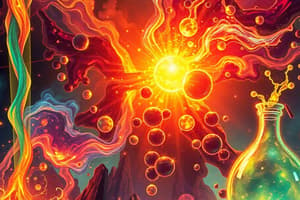Podcast
Questions and Answers
What is a chemical reaction?
What is a chemical reaction?
A process where one type of matter is changed into another type of matter through a series of steps.
What are the two main types of chemical reactions?
What are the two main types of chemical reactions?
Synthesis and decomposition.
How do chemical equations simplify the representation of chemical reactions?
How do chemical equations simplify the representation of chemical reactions?
By showing what happens during a chemical reaction using symbols like + and - to represent the transferring of electrons between atoms and ions.
Explain the combustion reaction involving carbon burning in excess oxygen.
Explain the combustion reaction involving carbon burning in excess oxygen.
Why is balancing chemical equations important?
Why is balancing chemical equations important?
What is the purpose of balancing chemical equations?
What is the purpose of balancing chemical equations?
Explain the significance of identifying the limiting reactant in a chemical reaction.
Explain the significance of identifying the limiting reactant in a chemical reaction.
Why do chemists need to pay attention to the charges of elements when balancing equations?
Why do chemists need to pay attention to the charges of elements when balancing equations?
What does it mean when a charge disappears in a chemical reaction?
What does it mean when a charge disappears in a chemical reaction?
How does balancing chemical equations help chemists predict the products of reactions?
How does balancing chemical equations help chemists predict the products of reactions?
Flashcards are hidden until you start studying
Study Notes
Chemical Reactions in Chemistry
A chemical reaction is a process where one type of matter is changed into another type of matter through a series of steps. These changes occur when atoms from different elements are rearranged within molecules. There are two main types of chemical reactions: synthesis, which involves combining two compounds together; and decomposition, which occurs when a compound is broken down back into its simpler parts.
Chemical equations simplify these processes by showing what happens during a chemical reaction using symbols like + and - to represent the transferring of electrons between atoms and ions. For example, consider a simple combustion reaction: carbon (in the form of charcoal) burns in excess oxygen to produce carbon dioxide gas. This can be represented as: C + O₂ → CO₂. In this equation, C represents the charcoal reactant, O₂ stands for the molecular oxygen, and CO₂ signifies the product formed after the reaction has taken place.
In general chemistry classes, students learn how to balance such chemical equations because it helps them understand which materials participate in the reaction and whether they're being consumed or produced. Balancing involves making sure that all the atoms involved have equal numbers of each kind of atom before and after the reaction takes place. If we were to balance our previous combustion reaction, it would look like this:
C + 2O₂ → CO₂
This indicates that there is now two times more oxygen involved in order to make up for the difference in the number of carbon atoms present before and after the reaction.
When balancing equations, chemists also need to pay attention to the charge of each element in order to ensure that everything adds up correctly. Charges can either disappear or change, but their sum must remain constant throughout the entire process. Furthermore, balancing requires identifying the limiting reactant—the substance that gets used completely while others still exist in the end mixture—since it determines how much of any particular product will be made. By understanding these principles and practices, chemists can accurately predict the products resulting from various chemical reactions.
Studying That Suits You
Use AI to generate personalized quizzes and flashcards to suit your learning preferences.




